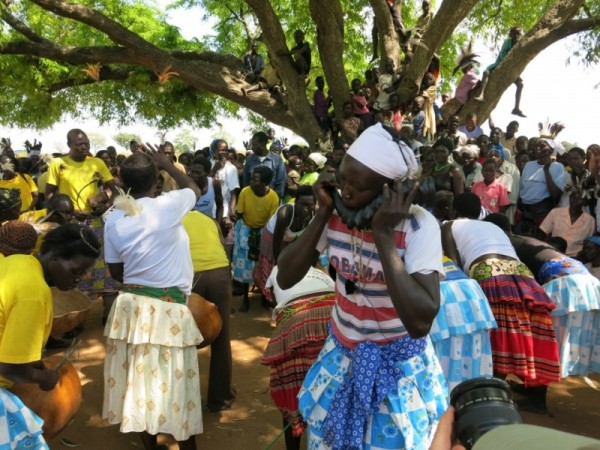Sabina, an Acholi woman from the village of Acet, performed with ‘Umuny Jubi Ite Yaa’ – a women’s group from a nearby IDP camp on our first recording day in Northern Uganda. Sabina played the ‘Uvure’ a type of horn for this women’s group and blew us away. Like Evelyn Ojok her husband was killed in the war after he was abducted and taken into the bush by the LRA. She has 7 children and 4 of them love to sing and dance, mainly through learning at school.
What does this music mean to you?
The Acholi often give meaning and purpose to things in daily life. (The name of the primary school in this village translates to ‘The Drunk Huntsman’ and Acet, a town that perhaps used to be a bad place, we were told meant ‘a shit’.. ). This means that all of our songs have a purpose, we dance and sing about occasions, it is never for just entertainment. Our first song, ‘Welo Obino’ is sung to welcome visitors, a celebration for new comers in the village. That is why we sang it for you first. We then sang ‘Dug Gang’ which is to celebrate the end of war, to call the people over to tell them we are in peace. ‘Alocaloca’ was our final song: it is all about change. It is mainly sung to mark the end of a dispute or a war. These songs now mean more to us as the hardship in Northern Uganda is slowly coming to an end.
What are the different roles within the group?
Most of us only sing and dance, as most women do in Acholi music. I play the Uvure and sing because I can’t dance, as I had a serious operation 4 years ago. I can’t dig, dance or do anything physical, so I play the horn. This is a blessing and a gift from God because I could never play it before the war or before the operation, it is a gift from Him to help me heal. We also have the Rigi Rigi (tube fiddle, similar to the Orutu) the Bul (drums) and the Agwara (similar to a calabash) but mainly, as you saw, we sing and we dance.
Hannah
December 2012

